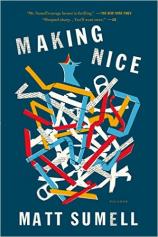Making Nice
Review
Making Nice
Alby, the middle child of three in a family fraught with disorder and dysfunction, takes us along on his journey from the exquisite, repetitive pain of his mother’s death to a final “good feeling, a nice feeling” after repairing his father’s home several years later. MAKING NICE is Matt Sumell’s debut novel, and he shows with honest, unflinching stories how to wage war against, around and for his family. It is a long, explicit battle.
Alby fights a lot. In “Punching Jackie,” he lists the people he has hit. He itemizes the reasons he has punched Jackie, his older sister, and we hear the first story about his mother. A few days before her death from cancer, she asks to see each of her children alone. First Jackie goes in, which makes sense to Alby because she is, after all, the oldest. But then AJ is invited into her hospital room, and Alby waits and waits, “not so quietly in the men’s room, and then quietly again with my sister.” When his mother at last asks for him, three days later, her single message to him is that he must not abuse ladies. She recalls the time when he was home from college and he threw a book at her head, and she scolds him despite his protesting that he does not remember. He leaves.
"The last sentences of MAKING NICE offer a reason for the novel. Alby’s search for the solace of his mother’s touch may seem to be a simplification, but we may take him at his word."
His sister does not recall the incident, but thinks it sounds like something he would do. His brother thought it made sense because Alby “was at the peak of his asshole stage back then” and then adds, “The first peak.” The genuine anguish that came from this private meeting with his mother intersects with a knife-throwing fight with Jackie, and it is only their shared solidarity --- false, temporary --- against their drug-hazed father that relieves the tension. They gang up on him and chase him upstairs.
A few months later, Alby finds a newly hatched Northern cardinal on the pavement, but decides this transparent blob with a beak is a falcon. He feeds Gary with a straw and eventually builds an aviary with the mosquito netting from his mother’s bed. His father and sister become interested in the bird’s progress, and one afternoon they all sit together on the lawn, eating sandwiches from the deli and watching the bird totter around. Alby jokes with Gary, and he warns the family bulldog to watch out for the talons. Gary was only a bird, Alby knew that, but it was the first good news they’d had in a year.
In another piece, Alby records events that occurred while he was drifting for months “between supermarkets and regular markets and organic co-op markets and corner stores.” He includes the lofty flight of a white plastic bag from an abandoned shopping cart floating into his left hand. He finds half an apple hidden under a bag of baking chocolate. He heard the announcement at Trader Joe’s: “Jennifer, the bananas are here.” He sees ordinary events and interprets them in extraordinary ways.
In “Testy,” Alby relates specific stories from his life, and then asks a series of multiple-choice questions. One of the possible answers is often a commentary on futility, or a nonsensical rant [“Tigers are C) not as cool as cobras before their tiger ears fall off, but after their tiger ears fall off, tigers are number one”] or wretchedly sad [“Do you bruise easily? E) It depends who’s hitting me”]. There is a break in the middle of this chapter: NO TEST MATERIAL ON THIS PAGE. But then he continues to explain why he is the way he is. He felt peaceful for 30 seconds after being struck in the face by a baseball when he was playing right field. For those 30 seconds, though, he will love baseball forever. We begin to understand the power those 30 seconds of peace had on him.
Each piece of Alby’s story reveals yet another facet of his life and how he got to where he now stands. The somewhat hazy progression of time only heightens the deliberate confusion of the stories’ relevance, because even as Alby finds jobs and girlfriends and places to stay, he also finds stashes of pills, cases of old beer, and bars he cannot remember. His character becomes more violent, more helpful, more ridiculous, more and less believable. And just when you have reached an overload of senseless, unprovoked violence, or just when the descriptions of sex (imagined or real) reach appallingly vivid lows, Alby touches us with a fragment of wisdom that is somehow appealing and fresh.
The last sentences of MAKING NICE offer a reason for the novel. Alby’s search for the solace of his mother’s touch may seem to be a simplification, but we may take him at his word.
Reviewed by Jane Krebs on February 27, 2015
Making Nice
- Publication Date: February 9, 2016
- Genres: Fiction
- Paperback: 240 pages
- Publisher: Picador
- ISBN-10: 1250081580
- ISBN-13: 9781250081582





